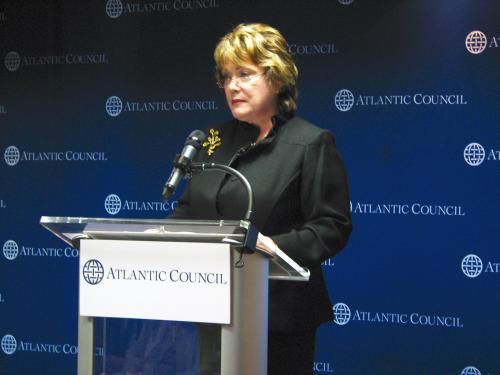
Ellen Tauscher, Under Secretary of State for Arms Control and International Security, says the United States is prepared to “put it in writing” that NATO missile defense systems are not aimed at Russia. At the same time, however, “We cannot provide legally binding commitments, nor can we agree to limitations on missile defenses, which must necessarily keep pace with the evolution of the threat.”
She made these remarks at Transatlantic Missile Defense: Phase II and the Lead Up to the NATO Chicago Summit, the Atlantic Council’s fourth annual conference on this subject.
Tauscher repeatedly underlined that “we must continue our efforts to develop missile defense cooperation withRussia.” She noted that “We are continuing work to establish a political framework that would open the way for practical cooperation on missile defense, including a center that would coordinate radar data and another center that would coordinate operations.”
In the boldest terms any administration official has yet used, she proclaimed, “The missile defense system we are establishing in Europe is not directed against Russia. We have said that publicly and privately, at many levels. We are prepared to put it in writing.”
She laid this case out in great detail, declaring, “As full partners in missile defense, we would partner to counter threats originating outsideEurope, not each other. Our NATO European missile defense system is not and will not be directed at Russia, and Russiawould continue to be able to confirm that the system is directed against launches originating outside Europe and not from Russia.”
In fact, she noted, “The EPAA [European Phased Adaptive Approach] does not possess the technical capability to undermine Russia’s strategic nuclear forces nor do we seek to develop a system that could. The mission of our missile defenses in Europe is to counter launches from the Middle East, which would be few in number and at an early stage of technology.” Indeed, “To perform this mission, engineering choices have been made: the system is and will continue to be capable of countering small numbers of launches of modest sophistication from the south. It has no capability to counter Russian strategic forces, given their location, numbers, and advanced technology. This is true of phases 3 and 4, as well as 1 and 2.”
One the other hand, Tauscher noted, while “we welcome an opportunity to continue and expand the sharing of technical information on the EPAA with Russian experts on an interagency basis, to demonstrate what it can and cannot do,” the United States and NATO “cannot provide legally binding commitments, nor can we agree to limitations on missile defenses, which must necessarily keep pace with the evolution of the threat.”
Still, “through cooperation we can demonstrate the inherent characteristics of the system and its inability to undermine Russian deterrent forces or strategic stability.”
Will this satisfy Vladimir Putin and other major players inRussia? It’s difficult to say, in that it’s never obvious which of their public statements are bluster and which represent genuine policy.
While it’s blindingly obvious from a Western standpoint that NATO has no designs on Russia and that, of course our missile defense concerns are mostly geared toward a nuclearIran, one can understandMoscow’s trepidation. After all, the missile defense project began in a serious way during the period when Ronald Reagan was calling the oldSoviet Unionan “evil empire.” And the fact that NATO began as a counterweight to Soviet expansion–and is still seen as a bulwark against Russian aggression by theAlliance’s newest members– is a major obstacle forRussiato overcome.
At the end of the day, Putin and company have no real alternative but to embrace NATO’s policy and the olive branch of technical sharing. Whatever desires he might have for recapturing the glory days of the Soviet empire, it’s nowhere near Russia’s grasp. And after eighteen years of progress, he surely doesn’t want to throw away Russia’s chance at joining the WTO and gaining its benefits.
Accepting the reality of missile defense may be a bitter pill but Putin has to swallow it. Whether this is accompanied by a thaw in the rhetoric, however, is optional.
James Joyner is managing editor of the Atlantic Council.
Image: tauscher-atlantic-council-2009.jpg
